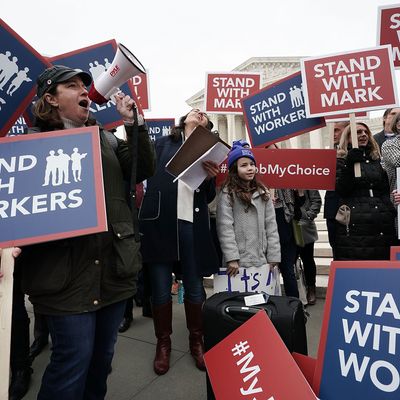
The Janus v. AFSCME decision on the last day of the Supreme Court’s current term landed with the heavy thud of a second shoe dropping. It had been widely predicted, from the moment Neil Gorsuch replaced Antonin Scalia and broke a 4–4 tie that gridlocked the Court in a virtually identical 2016 case (Friedrichs v. California Teachers Association), which happened to reach SCOTUS after Scalia’s death.
While expected, the decision was a historic blow to the labor movement, and particularly to the public-sector unions that are the labor movement’s recent base for much-needed growth. It basically institutes “right-to-work” rules for public-sector unions nationally —regardless of state labor laws — by keeping them from charging nonmembers “agency fees” to offset the cost of representing them (which they are required to do). To be clear, nonmembers are already exempt from paying fees associated with public-sector unions’ explicitly political activities.
But under the legal theory for this decision, as laid out by Justice Samuel Alito in the five-justice majority opinion, every action by public-sector unions is inherently political, which means that compelling financial support via a state law authorizing agency fees is essentially a government violation of employees’ rights of free speech and association, thus violating the First Amendment. Alito acknowledged the common-sense “free rider” argument for requiring employees who benefit from union collective bargaining to help defray associated costs, but brushed it aside as insufficient to justify a First Amendment violation. The majority also gave some weight to the difficulty of determining how to calculate agency fees without requiring employees to subsidize activities remote from collective bargaining.
The decision is a relatively rare direct overruling of a Supreme Court precedent — in this case, a unanimous 1977 decision in Abood v. Detroit Board of Education that explicitly approved state-required agency fees for public-employee unions. Alito flatly says Abood was wrongly decided. And Chief Justice Roberts, often thought to be the champion of stare decisis (that is, honoring precedent) silently went along.
In a strongly worded dissent joined by the Court’s liberal minority, Justice Kagan treated the decision as an act of anti-labor aggression:
[The] decision will have large-scale consequences. Public employee unions will lose a secure source of financial support. State and local governments that thought fair-share provisions furthered their interests will need to find new ways of managing their workforces. Across the country, the relationships of public employees and employers will alter in both predictable and wholly unexpected ways. Rarely if ever has the Court overruled a decision—let alone one of this import—with so little regard for the usual principles of stare decisis.
There are no special justifications for reversing Abood. It has proved workable. No recent developments have eroded its underpinnings. And it is deeply entrenched, in both the law and the real world. More than 20 States have statutory schemes built on the decision. Those laws underpin thousands of ongoing contracts involving millions of employees. Reliance interests do not come any stronger than those surrounding Abood. And likewise, judicial disruption does not get any greater than what the Court does today.
There was some low political comedy surrounding this deadly serious decision. Embattled Illinois governor Bruce Rauner, who began the litigation that led to the Janus decision, has been hanging around Washington since the weekend awaiting his vindication. He’s hoping to elevate his status as an anti-union figure to keep restive conservatives in his corner in his uphill battle for reelection in November.
Public-sector unions will survive this decision, much as private-sector unions have survived in right-to-work states where they are not allowed to collect any fees or dues from nonmembers. But the labor movement must now reconsider the economics and politics of how unions conduct their business in light of a hostile Supreme Court majority and hostile elected governments in Washington and many states.






























